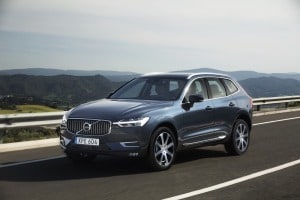Thirty Percent of Dealership Sales to Come Through Internet; Edmunds.com's 'Strategies for Smart Car Buyers' Helps Shoppers Save Time and Money
FOR IMMEDIATE RELEASE
Thirty Percent of Dealership Sales to Come Through Internet; Edmunds.com's 'Strategies for Smart Car Buyers' Helps Shoppers Save Time and Money
SANTA MONICA, Calif. (March 2, 2005) — Soon nearly 30 percent of new cars will be purchased through car dealerships' Internet departments, and that number is expected to continue to grow as consumers become more savvy about the convenience and savings available. "Strategies for Smart Car Buyers," second edition, explains how to locate and price cars online and maximize savings by working with the Internet department at a dealership. Written by the editors at Edmunds.com (www.edmunds.com), the premier online resource for automotive information, the book teaches consumers that using the Internet wisely can save hours at a dealership and makes car buying faster, easier and less stressful than ever before.
"The only reasons most people need to go to a car dealership are to test-drive the car and sign the contract," said Philip Reed, "Strategies for Smart Car Buyers" co-author and Edmunds.com Senior Consumer Advice Editor. "Consumers should use the Internet, telephone and fax machine to research vehicle options and prices, to receive price quotes and to secure financing before ever setting foot in a car dealership."
Over the past five years, perhaps the biggest change at car dealerships is that most have created an Internet department, where commissions are based on sales volumes rather than transaction prices. This motivates Internet department salespeople to quickly offer each customer an agreeable price. Internet department salespeople also approach the selling process differently because they are accustomed to customers who have done a lot of research and are prepared to buy.
How can consumers best take advantage of this new way to buy cars? Among other things, "Strategies for Smart Car Buyers" recommends going to the Edmunds.com website and selecting the "Free Price Quote" option. This allows any consumer to choose a car and then use "Dealer Locator" to quickly send e-mails to multiple dealerships to check availability and receive price quotes from Internet department salespeople.
To illustrate the difference between online car buying and traditional methods, the Edmunds.com editors attempted a number of different approaches and ultimately saved about $1,000 by buying a $20,000 car through the dealer's Internet department. Describing these test cases in detail, "Strategies for Smart Car Buyers" teaches consumers what to expect and how to reap the benefits. For example, the book explains that some Internet departments prefer to call and give a price by phone. In that event, consumers should also ask to have the quote faxed to get written confirmation of the price. And consumers should make sure the fax describes the exact vehicle including all optional equipment, and confirm whether it includes related costs such as taxes, title, license and registration.
Since first published in 2003, "Strategies for Smart Car Buyers" has been thoroughly updated and expanded with 25 percent new content. In addition to the new strategies presented for online car buyers, the second edition offers the following new sections: Primer for Young Car Buyers, Dissecting a Lease Deal and Tips for Haggling.
Primer for Young Car Buyers
Mike Hudson, co-author of "Strategies for Smart Car Buyers" and Edmunds.com's 20-something Consumer Advice Editor, went undercover to find out how young car buyers are treated in the car buying process. He explains the simple ways young car buyers can overcome the common stereotypes attached to them.
Dissecting a Lease Deal
A car commercial that offers a new sedan for an amazingly low monthly lease payment is obviously designed to draw consumers into the dealership. But, in a real-world example described in the book, fine print in the ad lists the down payment, fees due at signing, mileage limits and sales tax, which added the equivalent of nearly $200 to the monthly payment and quickly made the lease far less appealing. This chapter gives consumers the knowledge they need to recognize a good deal.
Tips for Haggling
The Tips for Haggling section gives consumers the confidence to negotiate the best price for their vehicle, whether the negotiations are taking place in person, on the phone or by e-mail.
Along with the new content, the second edition of "Strategies for Smart Car Buyers" also contains all the great advice found in the previous edition: buying a new or used car, leasing a car, buying insurance and selling your old car. Car buyers tight on time can jump right to the 10 recommended steps found at the end of each section.
Also included is the popular investigative series "Confessions of a Car Salesman." For this assignment, Reed was sent to work undercover at two different dealerships to give readers an insider's perspective on the training, attitudes and behind-the-scenes tricks that dealers use to gain the upper hand. A Washington Post personal finance columnist declared that "Confessions of a Car Salesman" should be mandatory reading for all consumers before stepping on a car lot.
"Strategies for Smart Car Buyers" retails for $14.99 at most bookstores. Additional car-buying advice is available through the Strategies for Smart Car Buyers column at http://www.edmunds.com/advice/strategies/articles/index.html.
About the Co-Authors
Philip Reed is the senior consumer advice editor for Edmunds.com. A former newspaper reporter, Phil has also written a number of fiction and non-fiction books. He was initially hired by Edmunds.com to work as an undercover car salesman to better understand the automotive retailing business. The result was "Confessions of a Car Salesman" which is included in the "Strategies for Smart Car Buyers" book. After working as a car salesman, Phil took a more traditional role at Edmunds.com and found himself on the other side of the transaction — buying cars for the company's long-term vehicle test fleet. He believes that this dual role has given him unique insight into the relationship between the car salesperson and the American consumer.
Mike Hudson is a consumer advice editor for Edmunds.com. He spent four years covering economics and the automotive industry as a reporter at Detroit News and Detroit Free Press. Mike has won numerous writing awards, including being named the Michigan Press Association's "Young Writer of the Year" for 2003. His past work has appeared in newspapers across the country including USA Today, Philadelphia Inquirer, Miami Herald and Boston Globe. He continues to write a monthly column for Detroit News focusing on youth and cultural trends in the auto industry. For the second edition of "Strategies for Smart Car Buyers," Mike, who is in his twenties, went undercover to find out how "Generation Y" car buyers are treated during the car buying process.
About Edmunds
Edmunds.com is the premier online resource for automotive information. Its comprehensive set of data, tools and services, including Edmunds.com True Market Value® pricing, is generated by Edmunds.com Information Solutions and is licensed to third parties. For example, the company supplies content for the auto sections of NYTimes.com, AOL, About.com, iVillage.com and IGN.com, provides weekly data to Automotive News and delivers monthly data reports to Wall Street analysts. Edmunds.com also publishes a high-speed, on-screen car magazine called Inside Line available free at www.insideline.com. Edmunds.com was named "best car research" site by Forbes ASAP, has been selected by consumers as the "most useful Web site" according to every J.D. Power and Associates New Autoshopper.com StudySM and was ranked first in the Survey of Car-Shopping Web Sites as reported by The Wall Street Journal. The company is headquartered in Santa Monica, Calif. and maintains a satellite office outside Detroit.








